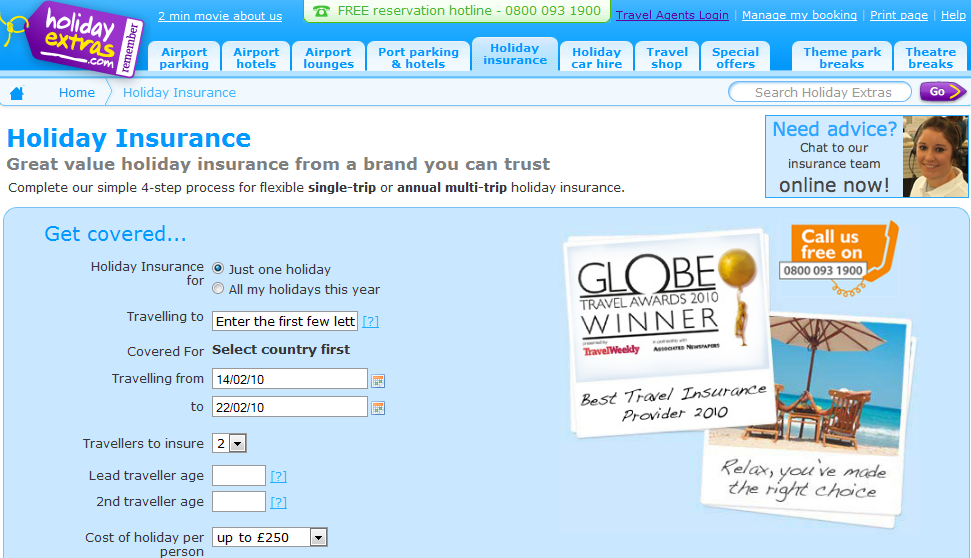Planning a dream holiday? Protecting your trip investment is crucial. Holiday insurance provides a safety net, covering unforeseen events like trip cancellations, medical emergencies, and lost luggage. This comprehensive guide explores the essential aspects of holiday insurance, from understanding different types of policies to navigating the claims process.
We’ll delve into the intricacies of holiday insurance, examining various factors influencing policy costs and highlighting the importance of thorough research when choosing a provider. Understanding your needs and the specific coverage options available is key to making the right decision.
Definition and Scope of Holiday Insurance

Holiday insurance provides financial protection for unforeseen events that may disrupt or negatively impact a planned holiday. It acts as a safety net, offering coverage for various potential issues, from trip cancellations to medical emergencies abroad. This comprehensive protection is designed to alleviate the financial burden of unexpected circumstances during your travels.
Types of Holiday Insurance Coverage
Holiday insurance policies typically include multiple coverage options, tailored to address diverse travel-related concerns. These coverages often include trip cancellation, medical expenses, lost or damaged baggage, and more. Understanding these different components is crucial for selecting a policy that aligns with your specific needs and travel plans.
Trip Cancellation and Interruption
This aspect of holiday insurance safeguards your investment against unforeseen events that may prevent you from traveling or force an early return. Circumstances like severe illness, natural disasters, or family emergencies can all be covered, minimizing financial loss. For example, if a pre-booked flight is canceled due to weather, trip cancellation insurance can reimburse your non-refundable flight tickets. Similarly, a sudden illness that prevents you from traveling could also be covered.
Medical Expenses Abroad
Holiday insurance provides crucial financial protection in case of unexpected medical emergencies during your trip. This coverage helps alleviate the cost of medical treatment, hospital stays, and repatriation, ensuring your well-being is prioritized. For example, if you require emergency medical care during your holiday, the insurance can cover the associated expenses.
Baggage Loss or Damage
This aspect of holiday insurance safeguards your personal belongings during your travels. If your luggage is lost, stolen, or damaged, the insurance can provide compensation for the value of the lost or damaged items. For example, if your luggage is lost during a flight, the insurance can help reimburse the cost of replacement items.
Travel Insurance vs. Holiday Insurance
While often used interchangeably, there are subtle differences. Travel insurance typically covers a broader range of activities and destinations, sometimes encompassing travel to work, while holiday insurance is more focused on leisure trips. The scope of coverage and exclusions might also vary.
Typical Exclusions in Holiday Insurance Policies
Holiday insurance policies usually have exclusions to prevent misuse or cover situations considered pre-existing conditions or self-inflicted injuries. Examples of common exclusions include pre-existing medical conditions, intentional self-harm, and participation in dangerous activities. These exclusions are Artikeld in the policy documents.
Factors Influencing the Cost of Holiday Insurance
Several factors influence the cost of a holiday insurance policy. These include the destination, length of the trip, travel dates, and the level of coverage required. Higher levels of coverage, particularly for medical expenses, often come at a premium.
Comparison of Different Types of Holiday Insurance
| Type of Coverage | Description | Example of Covered Situation | Example of Uncovered Situation |
|---|---|---|---|
| Trip Cancellation | Covers losses due to trip cancellation or interruption. | Flight cancellation due to weather. | Missing a flight due to oversleeping. |
| Medical Expenses | Covers medical expenses incurred during the trip. | Emergency hospitalisation abroad. | Pre-existing medical conditions. |
| Baggage Loss/Damage | Covers loss or damage to checked or carry-on baggage. | Luggage lost during transit. | Damage caused by intentional actions. |
Key Components of a Holiday Insurance Policy
Holiday insurance policies are designed to protect travellers from unforeseen circumstances during their trips. Understanding the key elements of a policy, including coverage, claims procedures, and exclusions, is crucial for a smooth and worry-free vacation. This section will Artikel the essential components of a typical policy.
Policyholder Rights and Responsibilities
Policyholders have specific rights and responsibilities when it comes to their holiday insurance. Understanding these rights ensures that you’re aware of what you’re entitled to, and responsibilities help you maintain the policy’s coverage. The policy will clearly Artikel the scope of coverage and the necessary steps to be taken in case of an incident. For instance, a policy might require notifying the insurer within a certain timeframe or providing supporting documentation. Failure to meet these responsibilities could result in a claim being denied.
Coverage Details
A typical holiday insurance policy offers comprehensive coverage to address various potential issues. This encompasses medical expenses, trip interruption, and lost or damaged belongings. Specific coverage details are often Artikeld in the policy document. Examples include the maximum coverage amount for medical expenses or the duration of trip interruption protection. The policy will clearly define what situations are covered and the extent of that coverage.
Claim Procedure
Filing a claim under a holiday insurance policy typically involves a structured process. It’s crucial to understand the steps involved to ensure a smooth and efficient claim settlement. The following procedure is a general guideline and may vary slightly based on the specific policy.
- Initial Notification: Contact the insurance provider as soon as possible after the incident. This is often the first step and is essential for initiating the claims process. Provide a detailed description of the event.
- Documentation Collection: Gather all relevant documents, such as medical bills, flight tickets, and receipts. The completeness and accuracy of the documentation are crucial for the claim process. Provide evidence to support your claim.
- Claim Form Submission: Complete the claim form accurately and submit it along with the collected documents to the insurance provider. This form is crucial for initiating the claim process and should be filled out carefully.
- Claim Assessment: The insurance provider will assess the claim based on the submitted documentation and policy terms. This assessment ensures the claim meets the policy requirements.
- Payment Processing: If the claim is approved, the insurance provider will process the payment according to the agreed terms. This involves verification of all the submitted information.
Types of Coverage
Holiday insurance policies often include various coverage types to protect travellers in different scenarios.
- Medical Expenses: Covers medical expenses incurred during the trip, including hospitalization, doctor’s visits, and medication. This is often a crucial aspect of holiday insurance, providing financial security in case of illness or injury.
- Trip Interruption: Covers expenses if the trip has to be cut short due to unforeseen circumstances, such as a natural disaster or illness. This coverage protects against financial losses due to trip cancellations or interruptions.
- Lost Luggage: Covers the replacement cost of lost or damaged luggage, including clothing, personal items, and essential documents. This coverage helps travellers recover from the inconvenience of lost belongings.
- Travel Delay: Covers expenses incurred due to a delay in travel. This could include accommodation, meals, or additional transportation costs.
Claims Process Table
The following table Artikels a typical claims process, highlighting key steps and timelines. This information is a general guideline and may vary depending on the insurance provider and policy.
| Step | Description | Timeline |
|---|---|---|
| Notification | Contact the insurer as soon as possible. | Immediately |
| Documentation Gathering | Collect necessary documents (medical bills, receipts). | Within 24-48 hours |
| Claim Form Submission | Complete and submit the claim form. | Within 7 days |
| Assessment | Insurer assesses the claim. | 7-14 days |
| Payment | Payment is processed. | 14-21 days (or as per policy) |
Policy Exclusions
Some events are excluded from coverage under a holiday insurance policy. These exclusions help define the limitations of the policy and avoid any misunderstandings.
- Pre-existing Conditions: Medical conditions that existed before the trip are often excluded. This is a common exclusion to prevent fraudulent claims.
- Acts of War or Terrorism: Events like war or terrorism are usually excluded from coverage. This is due to the unpredictable and catastrophic nature of such events.
- Intentional Acts: Damage or injury caused intentionally by the policyholder is generally not covered. This prevents misuse of the insurance policy.
- Self-Inflicted Injuries: Injuries caused by the policyholder’s own actions or recklessness may be excluded.
- Coverage Limitations: Policies often have limitations on coverage amounts and durations, which are clearly stated in the policy document.
Factors Influencing the Need for Holiday Insurance

Holiday insurance can significantly ease the anxieties associated with travel, offering peace of mind for unforeseen circumstances. Understanding the factors that influence the need for this protection is crucial for making informed decisions about purchasing coverage. The decision to secure holiday insurance often hinges on several key considerations, ranging from the destination to the individual’s travel style and financial situation.
Situations Where Holiday Insurance is Highly Recommended
A comprehensive holiday insurance policy is strongly advised for travelers facing heightened risks. These risks often stem from potential disruptions to travel plans, unforeseen medical emergencies, or unforeseen circumstances that can impact financial well-being. This protection offers a safety net in case of unforeseen events, offering financial support during challenging situations.
- Traveling to destinations with limited or challenging medical facilities. Medical expenses abroad can be substantial, and lacking access to readily available quality medical care in a foreign country can lead to significant financial burdens. Holiday insurance can provide coverage for medical emergencies, including necessary transportation and treatment, reducing the financial strain associated with these situations.
- Booking flights and accommodations on a tight budget or a limited timeframe. Unexpected delays, cancellations, or disruptions can significantly impact travel plans and lead to substantial financial losses if not adequately protected. Holiday insurance can offer coverage for these issues, providing compensation for missed flights, accommodations, or other travel-related expenses. It’s particularly relevant for those who cannot easily absorb financial losses.
- Participating in adventurous activities or extreme sports. Certain activities, such as skiing, mountaineering, or white-water rafting, inherently carry a higher risk of injury or accidents. Holiday insurance that covers these activities can provide financial assistance for medical expenses or repatriation in case of a mishap.
Situations Where Holiday Insurance Might Be Less Essential
Not all travel scenarios require the same level of protection. There are situations where the need for holiday insurance might be less critical, often depending on the individual’s travel plans and financial situation. For example, a short trip to a well-developed tourist destination with readily available medical services might not require the same level of insurance coverage as a lengthy journey to a less developed region.
- Short trips to well-established tourist destinations with readily available medical facilities and emergency services. If a trip involves a short stay in a familiar location with robust healthcare systems, the potential risks are generally lower. In such instances, the financial implications of unexpected issues might be less significant, potentially making comprehensive insurance less essential.
- Travelers with substantial personal savings and a high tolerance for financial risk. If an individual has significant financial reserves and is comfortable bearing the risk of potential financial losses, the need for extensive insurance coverage might diminish.
- Trips that involve minimal risk, such as a planned family vacation to a familiar and well-equipped resort, might not necessitate the same level of coverage as more complex or adventurous trips.
Examples of Scenarios Where Holiday Insurance Could Be Crucial
Holiday insurance can be instrumental in mitigating financial hardship during challenging situations. Consider these examples.
- A family traveling to a remote jungle region for a nature expedition experiences a severe illness. Without insurance, the family could face substantial medical expenses, potentially disrupting their entire trip. Holiday insurance can cover medical treatment, repatriation, and other expenses.
- A solo traveler’s flight is canceled due to severe weather conditions. This cancellation might lead to significant delays and additional costs if not covered by holiday insurance. The insurance can provide reimbursement for lost flights, accommodations, and other associated expenses.
Correlation Between Travel Destination and Insurance Necessity
The need for holiday insurance often correlates with the destination. Travel to a developing country with limited medical infrastructure, or to a remote area, often requires more extensive insurance coverage compared to a trip to a developed country with well-established healthcare facilities.
| Travel Destination | Insurance Necessity |
|---|---|
| Developed Countries (e.g., Western Europe, North America) | Potentially less essential, but still advisable for comprehensive coverage |
| Developing Countries (e.g., some parts of Africa, South America) | Highly recommended due to potential medical challenges and limited access to quality care |
| Remote or Isolated Locations (e.g., mountainous regions, islands) | Highly recommended, especially if engaging in activities that present higher risks |
Factors Affecting the Decision to Purchase Holiday Insurance
Several factors influence the decision to purchase holiday insurance. These factors include the nature of the trip, the traveler’s financial situation, and the destination’s risk profile.
- The cost of the holiday insurance policy itself often plays a significant role. The price is often weighed against the potential risks and benefits.
- The level of financial risk tolerance also influences the decision. Those who are less comfortable with financial risks are more likely to purchase insurance.
- The type of travel, whether adventurous or routine, is also a crucial consideration. Trips involving higher risks, like extreme sports or venturing to remote locations, often warrant more comprehensive insurance coverage.
Comparison of Different Holiday Insurance Providers

Choosing the right holiday insurance provider can significantly impact your trip’s peace of mind. Understanding the various options available, their pricing structures, and customer feedback is crucial for making an informed decision. Different providers offer varying levels of coverage and support, so careful comparison is essential.
A thorough comparison of holiday insurance providers allows travellers to identify policies that best align with their specific needs and budget. This involves evaluating not only the scope of coverage but also the provider’s reputation, customer service responsiveness, and financial stability.
Services Offered by Different Providers
Various providers offer distinct services, ranging from comprehensive trip cancellation protection to medical emergency assistance and baggage loss coverage. Some providers specialize in particular destinations or travel types, tailoring their policies to cater to specific needs. This specialization can lead to better tailored coverage for particular circumstances, such as adventure travel or travel to regions with specific health risks. For example, a provider focused on skiing holidays may offer specific protections for injuries sustained during skiing activities.
Pricing Models of Holiday Insurance Providers
Insurance providers employ diverse pricing models. Factors such as the destination, duration of the trip, travel type, and the level of coverage selected influence the premium amount. Some providers use tiered pricing systems, offering different levels of coverage with varying price points. Others might offer discounts for bundled travel packages or loyalty programs. For example, a provider might charge a higher premium for a trip to a remote, high-risk destination compared to a trip to a popular tourist destination.
Customer Reviews and Feedback
Customer reviews and feedback provide valuable insights into the experiences of previous policyholders. Online review platforms and forums offer valuable information about the strengths and weaknesses of different providers. Reviews can highlight aspects like the promptness of claims processing, the helpfulness of customer service representatives, and the overall satisfaction with the policy’s coverage. For instance, some reviews might highlight excellent customer service, while others may mention difficulties in filing a claim.
Comparative Analysis of Policy Features and Prices
The table below presents a comparison of policy features and prices from multiple providers, providing a concise overview of the available options.
| Provider | Trip Cancellation Coverage | Medical Emergency Coverage | Baggage Loss Coverage | Price (USD) |
|---|---|---|---|---|
| Travel Guard | Excellent | Good | Fair | $150 |
| InsureMyTrip | Very Good | Excellent | Good | $180 |
| World Nomads | Good | Excellent | Excellent | $220 |
Effective Research Strategies for Different Providers
Thorough research is key to selecting the most suitable holiday insurance provider. Begin by identifying your specific needs and preferences regarding coverage and support. Compare the policies offered by various providers, noting the details of coverage, exclusions, and pricing. Utilize online resources such as comparison websites and customer review platforms to gather insights from other travellers. For instance, a traveller seeking comprehensive medical coverage may prioritize a provider with a robust medical emergency assistance program. Also, read the fine print of each policy carefully to understand the exclusions and limitations.
Claims Process and Resolution
Navigating the claims process can be a crucial aspect of holiday insurance. Understanding the steps involved, potential reasons for denial, and typical resolution times empowers travellers to effectively manage their expectations and pursue their claims confidently. A well-structured claims process fosters trust and ensures fair compensation for legitimate claims.
The process for resolving holiday insurance claims varies significantly between providers. Thorough policy review is vital to comprehend the specific procedures and conditions Artikeld in your chosen policy. This knowledge ensures that you lodge your claim appropriately and increase your chances of a successful outcome.
Steps Involved in Making a Holiday Insurance Claim
To initiate a claim, a systematic approach is essential. Generally, the process involves gathering necessary documentation, contacting the insurance provider, and providing supporting evidence to substantiate the claim. The exact steps may differ slightly between providers, but the core principles remain consistent.
- Initial Assessment: Thoroughly review your policy and identify the covered event. This involves understanding the specific terms and conditions pertaining to the incident.
- Documentation Collection: Gather all relevant documents, such as receipts, medical reports, police reports, and flight confirmations. This meticulous collection of evidence is critical for supporting your claim.
- Contacting the Insurance Provider: Reach out to the insurer through the designated channels, such as phone, email, or online portal, to report the claim and initiate the formal process.
- Claim Form Completion: Complete the claim form accurately and thoroughly, providing all requested information and details. This step helps expedite the claim processing and ensures clarity for the insurer.
- Providing Supporting Evidence: Submit the collected documents to support your claim. Ensure all evidence aligns with the policy’s requirements.
Common Reasons for Claim Denial
Understanding potential reasons for claim denial allows travellers to avoid common pitfalls. Failure to meet the policy’s requirements or provide sufficient evidence can lead to claim rejection.
- Policy Exclusions: The claim may fall outside the policy’s coverage, such as pre-existing medical conditions not disclosed or events explicitly excluded. Carefully reviewing the policy exclusions is crucial.
- Insufficient Documentation: Missing or incomplete documentation, such as medical reports or police statements, may result in claim denial. Ensure all necessary documents are provided in a timely manner.
- Failure to Adhere to Policy Conditions: Failure to follow the policy’s procedures, such as notifying the insurer within a specified timeframe, could lead to rejection.
- Fraudulent Claims: Deliberate misrepresentation of facts or circumstances can lead to the denial of a claim.
Typical Timeframe for Claim Resolution
The time taken to resolve a claim varies depending on the complexity of the incident and the insurer’s workload. It’s crucial to understand the typical timeframe for your provider.
The average claim resolution time typically ranges from a few weeks to several months. Factors like the severity of the event, the volume of claims, and the insurer’s internal processes can affect the timeframe.
Holiday insurance can be a lifesaver, covering unexpected issues like flight cancellations or lost luggage. For comprehensive coverage, you might want to consider adding a supplemental policy, such as with AXA car insurance, to protect your vehicle while you’re away. Ultimately, the right holiday insurance will depend on your specific needs and travel plans.
Step-by-Step Guide to Lodging a Claim
A structured approach to lodging a claim improves the chances of a smooth and efficient resolution.
- Review your policy: Understand the specific terms and conditions, coverage details, and the claims process Artikeld by your provider.
- Gather supporting documents: Compile all necessary documents, including receipts, medical records, police reports, and flight confirmations.
- Contact your insurer: Notify your insurer through the designated channels and provide details about the incident.
- Complete the claim form: Accurately complete the claim form, providing all required information and details.
- Submit supporting evidence: Submit the collected documents to support your claim.
- Follow up: Periodically check on the status of your claim with your insurer and request updates as needed.
Examples of Successful and Unsuccessful Claims
While specific examples are confidential, successful claims often involve a clear understanding of the policy and timely submission of comprehensive documentation. Conversely, unsuccessful claims frequently stem from insufficient documentation or a lack of adherence to the policy’s terms.
Current Trends and Future Outlook of Holiday Insurance

The holiday insurance market is experiencing dynamic shifts, driven by evolving travel patterns and technological advancements. Consumers are increasingly demanding comprehensive coverage, while providers are adapting to meet these needs. This adaptability is key to maintaining competitiveness in this evolving landscape.
Recent Trends in the Holiday Insurance Market
Several trends are shaping the modern holiday insurance market. A growing emphasis on personalized policies, tailored to specific travel styles and destinations, is a notable development. Furthermore, pre-trip medical checks are becoming more commonplace, offering peace of mind and facilitating quicker claims processing.
Impact of Technology on Holiday Insurance
Technology is revolutionizing holiday insurance. Digital platforms are streamlining the policy purchase process, allowing for greater convenience and accessibility. Mobile apps are now commonplace, enabling instant access to policy details, emergency assistance, and claim filing. This ease of access is a critical factor in the industry’s ongoing evolution.
Emerging Trends in the Industry
Digital claims processing is rapidly gaining traction. This approach allows for quicker claim settlement, reduced administrative burdens, and enhanced customer satisfaction. Integration of AI and machine learning is another emerging trend, offering potential for more accurate risk assessment and personalized pricing. This evolution will likely increase efficiency and create a more customer-centric environment.
Projected Growth of the Holiday Insurance Market
The holiday insurance market is expected to experience sustained growth in the coming years. A variety of factors, including increasing global travel and a rise in awareness of the importance of comprehensive protection, are driving this projection.
| Year | Projected Market Growth (%) | Reasoning |
|---|---|---|
| 2024 | 5.5% | Rising popularity of adventure travel |
| 2025 | 6.2% | Continued growth in international tourism |
| 2026 | 7.1% | Increased demand for flexible and adaptable coverage |
| 2027 | 7.8% | Enhanced digitalization of the claims process |
Potential Challenges Facing the Holiday Insurance Sector
Several challenges could potentially hinder the growth of the holiday insurance sector. Maintaining accuracy in risk assessment and pricing in an increasingly dynamic travel landscape remains crucial. Competition among providers is intense, requiring innovation and adaptability. Additionally, ensuring secure and efficient digital platforms to handle claims and customer interactions is essential. Cybersecurity threats and fraud prevention are also critical considerations in the digital age. The need to adapt to new and evolving risks, including natural disasters and political instability, is a constant challenge.
Practical Tips for Choosing Holiday Insurance

Holiday insurance can be a crucial component of a smooth and worry-free trip. Understanding how to select the right policy for your individual needs and preferences can save you from unforeseen circumstances and potential financial burdens. Choosing the appropriate coverage can significantly impact your travel experience.
Effective policy selection involves careful evaluation, comparison, and a thorough understanding of terms and conditions. This section provides practical tips to guide you through this process, empowering you to make informed decisions.
Evaluating Holiday Insurance Policies
Careful evaluation of policies is crucial before committing. Different providers offer varying levels of coverage and pricing. A comprehensive evaluation considers the specific nature of your trip, including duration, destination, and activities planned.
- Consider the coverage details: Ensure the policy covers the specific risks you anticipate, such as medical emergencies, trip cancellations, lost luggage, and travel delays. Review the policy’s exclusions carefully, as these can significantly limit your coverage.
- Scrutinize the policy’s exclusions: Pay close attention to the exclusions. Understanding what the policy doesn’t cover will help you determine if it’s suitable for your needs. Some policies, for example, may exclude coverage for pre-existing medical conditions or certain types of travel.
- Compare different policy features: Look beyond the basic coverage to evaluate features like emergency medical assistance, baggage delay compensation, and trip interruption benefits. Consider the features that best align with your travel plans and financial priorities.
Comparing Different Policies Effectively
Comparing policies effectively requires a structured approach. Avoid relying solely on price; instead, focus on the comprehensive coverage offered.
- Create a checklist: Develop a list of essential features and coverage levels for your trip, such as medical expenses, lost luggage, and trip cancellations. This will act as a reference point when comparing different policies.
- Use comparison tools: Many online resources provide comparison tools to facilitate the process. These tools typically allow you to input your trip details and receive personalized policy recommendations based on your criteria.
- Request quotes from multiple providers: Don’t hesitate to obtain quotes from various insurance providers to get a broader perspective on pricing and coverage options. Comparing quotes allows you to find the best value for your money.
Understanding the Terms and Conditions
Understanding the terms and conditions of a policy is paramount. This ensures you fully comprehend the scope of coverage and any limitations.
- Read the entire policy document: Don’t skim through the document; instead, take your time to read and understand every aspect of the policy, including the fine print. Pay close attention to the details, as they can make a significant difference.
- Seek clarification on any unclear points: If any aspect of the policy remains unclear, don’t hesitate to contact the insurance provider for clarification. Clarifying any ambiguities can prevent future issues and ensure you have a clear understanding.
- Pay close attention to specific dates and deadlines: Ensure you understand the policy’s terms regarding notification deadlines for claims and coverage periods. Meeting deadlines is crucial to successfully processing claims.
Reading the Fine Print
The fine print often holds crucial details about the policy. Carefully review it to understand the full scope of coverage and any limitations.
- Look for hidden exclusions: Hidden exclusions can significantly limit the policy’s effectiveness. Review the policy’s exclusions carefully to ensure they don’t negate the benefits of the coverage.
- Note specific limitations: Pay close attention to limitations on the types of incidents covered. For example, some policies may have limitations on coverage for pre-existing medical conditions or specific activities.
- Identify any geographical restrictions: If you’re traveling internationally, ensure the policy covers destinations outside your home country. Policies often have geographical limitations.
Selecting the Right Policy for Individual Needs
Choosing the right policy depends on individual circumstances and travel plans. Personal considerations and trip specifics should guide the selection process.
- Consider your budget: Evaluate the policy’s premium in relation to the coverage offered. A higher premium may translate to more comprehensive coverage, but it’s crucial to balance cost with the potential value of the coverage.
- Assess your risk tolerance: Consider your risk tolerance and the potential risks associated with your trip. If you’re traveling to a high-risk area or engaging in adventurous activities, you may need more comprehensive coverage.
- Review the claim process: Evaluate the insurance provider’s claims process to understand the procedures involved in making a claim. A straightforward claims process can ease the burden in case of an emergency.
Closure
In conclusion, holiday insurance is a vital component of any well-planned trip. This guide has illuminated the various aspects of these policies, from their fundamental definitions to the intricacies of the claims process. By understanding the factors influencing the need for insurance, comparing different providers, and carefully evaluating policies, you can make an informed decision that best suits your individual travel plans and budget. Safe travels!
Holiday insurance can be a lifesaver, covering unexpected issues like flight cancellations or lost luggage. For comprehensive coverage, you might want to consider adding a supplemental policy, such as with AXA car insurance, to protect your vehicle while you’re away. Ultimately, the right holiday insurance will depend on your specific needs and travel plans.
Holiday insurance can be a lifesaver, covering unexpected issues like flight cancellations or lost luggage. For comprehensive coverage, you might want to consider adding a supplemental policy, such as with AXA car insurance, to protect your vehicle while you’re away. Ultimately, the right holiday insurance will depend on your specific needs and travel plans.

